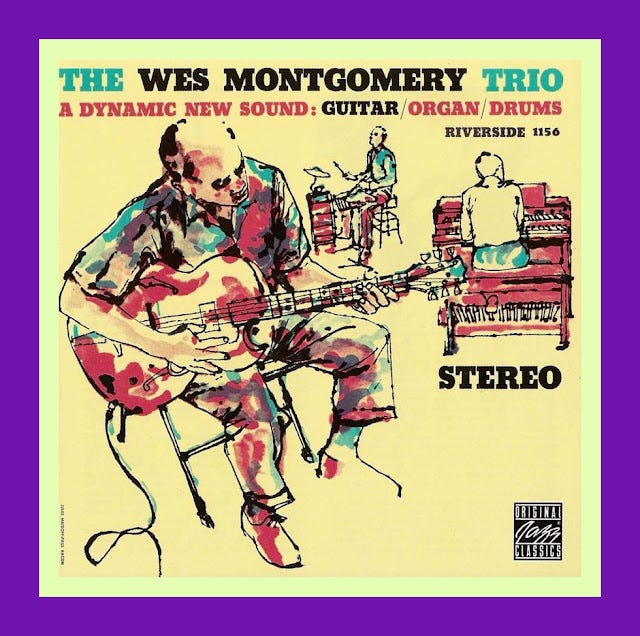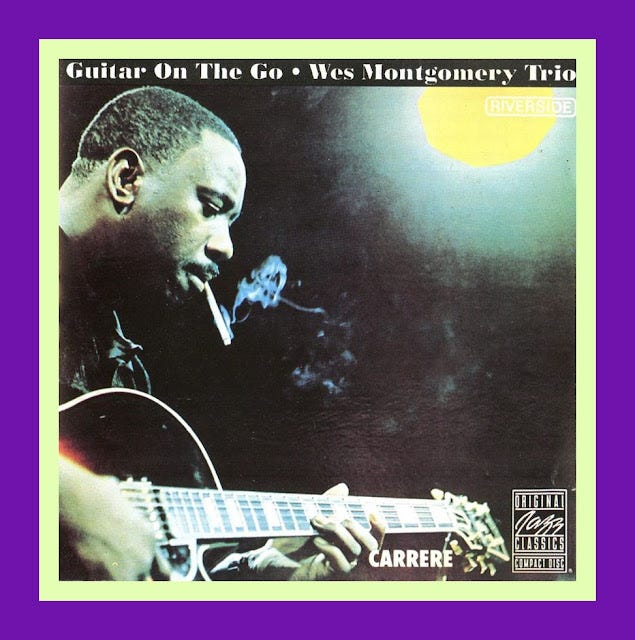© - Steven A. Cerra, copyright protected; all rights reserved.
Along with Charlie Christian and Django Reinhardt, Wes Montgomery formed a triumvirate of plectorists who were arguably the most influential Jazz guitarists of all time [although a strong case could be made for Chuck Wayne's, Barney Kessel's and Tal Farlow’s roles, collectively, in bringing Bebop to the Jazz guitar].
But because Wes has been such an iconic figure in Jazz guitar circles for almost 60 years since his death in 1968 at the ridiculously young age of forty-five [45], many Jazz fans are unaware of the fact that his recording career spanned only the last 8 years of his life. He made his first important recordings for Orrin Keepnews in 1960. And after that label went bankrupt in 1964, Creed Taylor brought him over to Verve where he had four years of blockbuster hit recordings before his passing.
And had it not been for Orrin Keepnews who acted on Cannonball Adderley’s recommendation to record him, Wes might have remained an obscure local Jazz figure based in Indianapolis who never came to the attention of the national and international Jazz public.
This reminiscence from Orrin explains how it all came about and it can be found in his The View from Within: Jazz Writings 1948-1987.
Some of My Best Friends
“All five of these essays were written to accompany examples of a particular form of album reissue called "twofers." The concept was thought up by Ralph Kaffel of Fantasy Records in the early 1970s and widely imitated by others (which is by no means a complaint on my part; it has meant the return to ready availability of a vast quantity of worthwhile jazz). Since these involved two records packaged together, there was always substantial room on the double interior surface for extensive annotation. And since this was inside space, not visible when the sealed unit was on display in stores, there was no incentive to have these notes do any sort of selling job. The result was often valuable and informative writing. Being in the frequent role of handing out such writing assignments, I was able to reserve the opportunity to express myself about several Riverside colleagues who had been very important to me.
At the times when these five pieces were written, however, there was a rather depressing ratio: three (Cannonball, Wes Montgomery, and Bill Evans) dead, and Johnny Griffin self-exiled to Europe for over a decade. It is somewhat helpful to note, as an update, that Nat Adderley remains a close friend, and that in 1978 Johnny Griffin began a series of regular return tours of this country, as one result of which we have been able to work together on five more albums. The 1983 Evans notes deal with a very specific portion of our association; although I had some internal reservations about their frankness, they surprised (and pleased) me by winning that year's Recording Academy Grammy award for Best Album Notes.”
Keep reading with a 7-day free trial
Subscribe to CerraJazz Substack to keep reading this post and get 7 days of free access to the full post archives.





